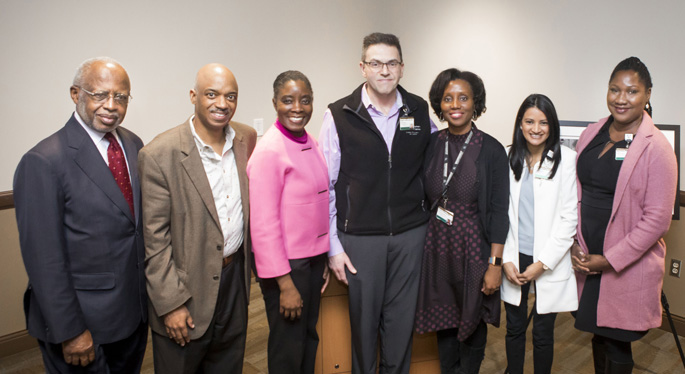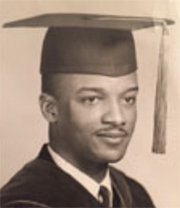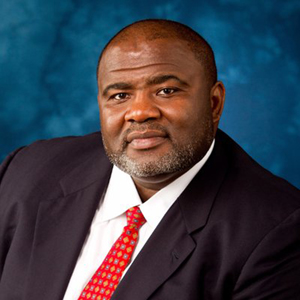
Vanderbilt’s Department of Psychiatry and Behavioral Sciences honored Vanderbilt’s first African-American resident, Harold Jordan, MD, on Feb. 8 by hosting the first lecture in his name.
Jordan began his residency in the Department of Psychiatry on July 1, 1964, just one day before President Lyndon Johnson signed the Civil Rights Act of 1964, mandating an end to discrimination in public accommodations. Following his training, Jordan joined the clinical faculty of Vanderbilt University School of Medicine — an appointment he maintained until 2016.
Aside from his prominent role in Vanderbilt’s history, Jordan’s extensive career includes appointments as chair of Psychiatry at Meharry Medical College, dean of Meharry’s School of Medicine and commissioner of Mental Health and Mental Retardation for the state of Tennessee.
“The Department of Psychiatry and Behavioral Sciences is honored to recognize the legacy of Dr. Harold Jordan at Vanderbilt University Medical Center and, by doing so, contribute to our growing efforts to make diversity and inclusion intentional,” said Stephen Heckers, MD, MSc, William P. and Henry B. Test Professor of Schizophrenia Research and chair of the department.
The lecture opened with recognition of Reema Dedania, MD, MPH, fourth-year Psychiatry resident at Vanderbilt, who was awarded the inaugural Dr. Harold Jordan Diversity and Inclusion Award for her contributions to the department’s diversity and inclusion goals.
With an interest in health inequities and disparities as they relate to mental illness, Dedania assisted with the creation of a clinic that focuses on the mental health needs of patients from a cross-cultural perspective, including immigrant populations.

During her residency, Dedania has also collaborated with Gilbert Gonzales, PhD, assistant professor in the Department of Health Policy, on two peer-reviewed articles that examine health disparities in the United States for foreign-born populations and immigrant LGBTQ mental health.
“I am deeply grateful to win the inaugural award for the Dr. Harold Jordan Diversity and Inclusion Lecture. Dr. Jordan’s unwavering commitment to ensuring diverse voices are heard in medicine has been a motivating force for others to follow in practice, myself included,” said Dedania. “Creating this lecture and award in his name is emblematic of our community’s need to continue to prioritize inclusion and accessibility, and I am grateful to be a part of these efforts.”
The lecture featured Lloyda Williamson, MD, professor and chair of Psychiatry and Behavioral Sciences at Meharry, as the first speaker in its series. Williamson, who was a medical student at Meharry during Jordan’s appointment as chair of Psychiatry, spoke to the importance of increasing the number of black psychiatrists and why that goal is a call to action for all those practicing in the field.
Although black Americans make up 13 percent of the U.S. population, the group accounts for only 4 percent of doctors nationwide. According to Williamson, this lack of black physicians — which is caused by several factors, including historical perspectives of race and barriers to resources and education — contributes to health disparities across the globe.
Conscious and unconscious racial bias continue to be prevalent, impacting treatment decisions such as medication doses, procedure options and referrals to specialty clinics for patients from underrepresented minorities.
“It affects our training and our patients, and we need to own up, take charge and be part of the solution,” said Williamson. “We can’t just stay in our clinical offices and research labs. We have to deal with some uncomfortable situations and discussions while knowing that we, our patients and our trainees will be better for it.”
Williamson encourages physicians to combat these disparities through intentional recruitment of minorities, taking a greater role in social justice advocacy, ensuring these populations are appropriately included in research and advocating for changes in medical education curricula to address cultural competence.
“I believe that all of us, as physicians and (particularly) psychiatrists, are obligated to address the implicit bias in medicine and to ‘do no harm.’ If we don’t, we are perpetually contributing to the health disparities across the nation,” said Williamson. “If we’re not part of the solution, we’re part of the problem.”















